Emmanuelle Gardan, Coimbra Group Office Director
As a network of universities which recently committed to enhancing their collaboration on climate change and sustainability, there is a lot that the Coimbra Group can do to facilitate the work of the European Commission related to climate and environmental policy. This is the message that echoed on 30 April during a fruitful high-level meeting where the Coimbra Group was invited by the European Commission’s Director-General for Climate Action, Mr Kurt Vandenberghe, and his team, to outline the main orientations of the Durham Declaration and its next steps.
The discussion reflected a great sense of alignment between the Coimbra Group (CG) and DG CLIMA. In these times marked by radical changes globally, but one unchanged issue at the nexus of all others – the challenge of climate change – the cooperation between the academic community and the European Commission was emphasized as being more essential than ever. As such the Durham Declaration was welcomed as a very strong signal.
Several promising opportunities for future dialogue and collaboration with DG CLIMA have emerged from this meeting, which was attended by the Executive Board (EB) Chair, Ludovic Thilly, together with the Vice-Chancellor of Durham University, Karen O’Brien, EB member Danny Donoghue, and CG Brussels Office. They will further nurture the first orientations of the implementation roadmap.
The need to continue doing science and advancing the scientific knowledge base on climate change and this, in all disciplines, including also the social sciences and humanities, was largely discussed in light of the current context. It was also commonly agreed that more transdisciplinary research and cross-sectoral work are still needed in this field.
The meeting addressed the critical role that universities play in translating knowledge into innovations and solutions to the climate crisis. Networks like the Coimbra Group, where member universities are closely engaged with their cities and local communities, can greatly contribute to scale up local experiments at European and global levels to help achieve the climate and sustainable development goals. They can also help building more success stories about sustainability, and what it means for the industry, for the economy, for society.
Other dimensions tackled during the exchange of views include the impact of education; universities’ engagement in science-based policy making; climate disinformation; as well as the importance of international engagement on climate and sustainability. Universities have by nature a fundamental role to play here. At the Coimbra Group, we can count on the Global Partnerships and Latin America Working Groups and their long-standing relations with partners outside Europe. The announcement of a presentation of the Durham Declaration at the COP30 in Brazil later this year also received positive feedback.
We now look forward to engaging CG members in this constructive dialogue with the Commission, in alignment with the commitment taken to “support transformative change through our actions as partners with public organisations”, one of the seven principles promoted in the Durham Declaration signed by the Rectors of CG Universities on 26 March 2025.
The Coimbra Group is proud to announce that registrations are now open for its Annual Conference and General Assembly 2025, hosted by the University of Bologna from 10 to 13 June. This year marks a special milestone as the network celebrates its 40th anniversary, under the overarching theme:
“Forty Years of Impact: Universities and Cities Shaping a Sustainable Future”
Since its foundation in 1985, the Coimbra Group has worked to foster academic collaboration, mobility, and shared values among Europe’s oldest and most prestigious universities. The 2025 edition of the Annual Conference will honour this legacy while looking to the future – especially focusing on the essential role of universities and cities in building sustainable societies.
Spotlight on the Poitiers Declaration
At the heart of the programme is the Poitiers Declaration, an initiative launched by the Coimbra Group in 2016 to champion stronger and more structured cooperation between universities and their cities. As we reflect on nearly a decade of its implementation, the 2025 Conference will serve as a platform to evaluate its impact and explore new avenues for collaboration in the context of sustainability and civic engagement.
Two open conferences
As part of the week-long programme, two open conferences will be held:
- 11 June – Universities and the Environment:
Building on the discussions of the Coimbra Group Climate Symposium held in March 2025 in Durham, this conference will explore the role of higher education institutions in addressing environmental challenges and driving climate action. - 12 June – Rectors and Mayors Roundtable:
This high-level dialogue will bring together university rectors and city mayors to discuss current university-city partnerships, share best practices, and identify new pathways for strategic cooperation.
Main highlights
As in every edition, all Coimbra Group Working Groups will hold their annual meetings, many of which will include joint workshops and collaborative events, encouraging interdisciplinary dialogue and shared learning.
Additional highlights of the week include:
- An Open Session on the European Universities Alliances titled: “How to handle the social responsibility with the Alliances?” – a timely and critical discussion on the societal impact of this major EU initiative.
- For the third consecutive year, the joint meeting of the Coimbra Group Universities with their Erasmus Student Network (ESN) local sections, to take stock of the implementation of the MoU between CG and ESN and decide further steps.
- A dissemination event of the Erasmus+ project EUniverse, focused on improving students’ mobility by implementing European values and civic engagement learning.
- The exciting final of the Coimbra Group 3MT (Three Minute Thesis) Competition, showcasing brilliant PhD candidates from member universities.
- And of course, the Annual General Assembly, where representatives will review achievements and plan for the future of the network.
Join us in Bologna
All relevant information, including the online registration form (open until 15 May) and the detailed programme, is available on the event website. We warmly invite colleagues from our member universities to take part in this special celebration of 40 years of impact.
In the meanwhile, don’t forget to keep updated with our activities and developments through the Coimbra Group social networks, and follow the hashtags #CoimbraGroup2025 and #CG40Years!
Karen O’Brien, Vice-Chancellor and Warden, Durham University
Durham University was proud to host the Coimbra Group’s inaugural Climate and Sustainability Symposium and to act as the convenor for the Coimbra Group’s Durham Declaration on Climate and Sustainability, which affirms our shared commitment to tackling climate change and placing sustainability at the heart of what we do as universities.
Dr Tony Juniper, the Chair of Natural England and a longstanding environmental campaigner, opened the symposium, noting that climate change is not a ‘future’ threat but is upon us now with real world consequences and that we need ambitious goals and targets to do something about it. The science underpinning climate change is overwhelming (a point emphasised too by keynote speaker Professor Mike Bentley, Durham University) – the challenge is for a shift in culture using a cross-disciplinary approach that emphasises the importance of deploying the social sciences and humanities. Tony Juniper urged the Coimbra Group, as research intensive and comprehensive universities, to recognise that they are in a very powerful position to do something about this. He also emphasised the aesthetic appeal of the natural world and the arts in reaching out to a wider public and motivating action to preserve and restore our planet.
The Climate Symposium showcased a range of exciting projects already underway within the membership that demonstrated the importance of building meaningful long-term civic and academic partnerships, influencing policy, and ensuring that universities play a leading role in shaping a greener, more resilient future. Professor Chris Smith (representing Science Europe and UKRI) provided the important message that research funders are also moving in this direction and want to work with universities to support this transition, including efforts to shape the broader research funding and policy discourse on climate and sustainability within Europe.
Student involvement before and during the symposium, including a keynote speech by Lana Par of the European Student Union, demonstrated the creativity, passion and commitment of young people. We were delighted that in advance of the symposium, many Coimbra Group universities participated in ‘Eyes on the Future’, a serious game about sustainability developed by Utrecht University. The winners of the student competition, travelled from Norway and Romania using an Interrail pass and participated fully in the symposium.
Sam Barratt, Chief, Youth, Education & Advocacy at UNEP, joined us and led discussions on the role UNEP could play in helping to accelerating progress on the actions outlined in the Declaration. He asked us to reflect on best practice for student participation, developing the green skills component and integrating their agency into the process. He also commented that the impact of our excellent existing initiatives could be expanded by working closely with other networks to provide outreach beyond Europe and to inject pace into activities. ‘Are we being radical enough’ was a key challenge posed by Sam. It was a challenge reflected too in relation to the unequal exposure to climate change experienced by nations around the world during an outstanding after-dinner speech by H.E. Mr Francois Jackman, Ambassador of Barbados and Permanent Representative to the United Nations.
While Coimbra Group universities have already created important and positive outcomes as innovators, educators, partners and investors, the symposium demonstrated that that there is so much more can be done by working together and sharing good practice on climate change and sustainability.
The symposium emphasised that we are faced with the triple planetary crisis of climate, pollution and biodiversity, all of which impact on the health of our human and natural environments. Working together across the Coimbra Group, we seek to engage with our student and staff groups of 1.5 million people to influence policy and research funders, advance education on climate and tackle global-scale research problems through strong research partnerships. In striving to do so, we place ourselves as central actors in the challenge of addressing the needs of the ‘life support system’ that is our planet and all those for whom it is home, and to do so in a way that protects against exacerbating global inequalities in wealth, health and education.
As Vice Chancellor of the host institution, I warmly thank all my fellow Rectors and Vice Chancellors for signing the declaration so quickly. Your enthusiasm and commitment send a very powerful public message that the Coimbra Group Universities are united in their commitment to sustainability and climate action. The adoption of the Durham Declaration marks a defining moment for the Coimbra Group and its member universities and underscores the Coimbra Group’s role as a global leader in higher education.
In signing the Declaration our member universities unite behind a shared set of principles that commit us to work to address climate change through research, education and policy engagement. The Declaration will help to guide the Group’s activities moving forward, including efforts to shape the broader policy discourse on climate and sustainability within Europe, to help shape public opinion, and to work together to turn ambition into meaningful impact.
From March 24-26, Durham University proudly hosted the Coimbra Group Climate Symposium, marking the official launch of the network’s 40th anniversary celebrations. The event gathered Rectors, Vice-Chancellors, researchers, students, and policymakers from across Europe to address the urgent role of universities as catalysts for transformative change in climate action, sustainability, and planetary health.

A symposium driving change
The two-day symposium provided a platform for rich discussions on the role of universities as Innovators, Educators, Partners, and Investors in sustainability. From groundbreaking climate research to embedding sustainability in education and policy, Coimbra Group universities reaffirmed their commitment to tackling the pressing global challenges of climate change and biodiversity loss.
Key highlights from the symposium
- Keynote by Tony Juniper (Natural England): Urged universities to move beyond short-term solutions and embrace long-term transformative action. Read more on the speech here or watch the two videos that Tony Juniper recorded for Durham University, for the Coimbra Group leaders and for students.
- Institutional Strategies Showcase: Universities of Leiden, Granada, and Trinity College Dublin shared best practices on integrating sustainability across research, education, and campus life.
- Panel on Universities and Research Funders: Experts from Durham, Utrecht, Coimbra, and Charles University, alongside UKRI, discussed funding strategies for impactful climate research.
- Polar Climate Research & Funding: A compelling talk by Mike Bentley (Durham University) introduced keynote speaker Christopher Smith (Science Europe), highlighting funders’ commitments to tackling climate challenges.
- Student Engagement: Sam Barratt (UNEP) led a dynamic discussion featuring insights from Barcelona, Cologne, Pavia, and Durham. Winners of the ‘Eyes of the Future’ Serious Game and Durham’s Sustainable Futures competition were celebrated.
- Closing Keynote by Lana Par (European Students’ Union): Reinforced the responsibility of universities in empowering students as active citizens for sustainability.
Graphic live illustration from the event
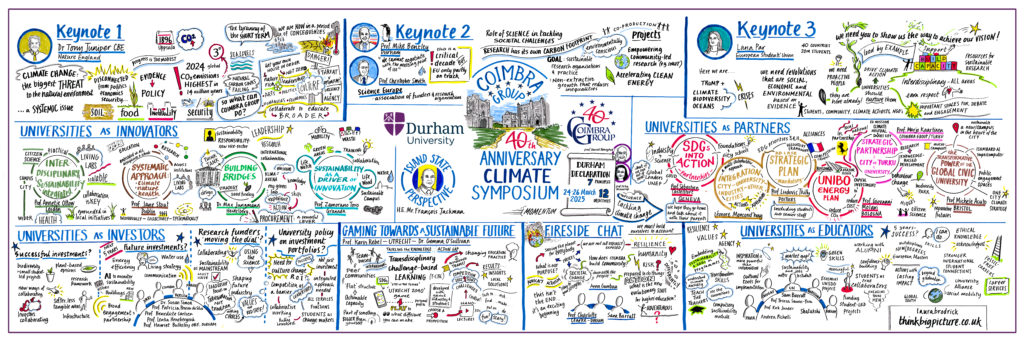
By Laura Brodrick, Graphic and Creative Facilitator, Think Big Picture
The launch of the Durham Declaration
The highlight of the symposium was the official adoption of the Durham Declaration on Climate Change and Sustainability, a landmark commitment by Coimbra Group universities to strengthen collective action in addressing climate challenges.
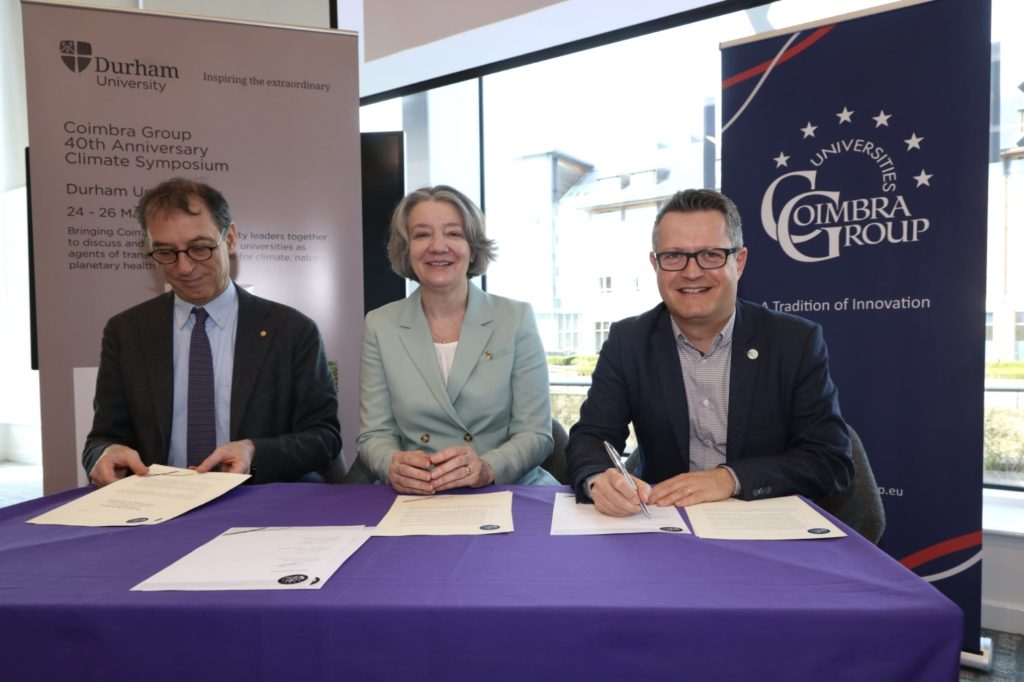
The Declaration, jointly prepared by Durham University, the Coimbra Group Executive Board, and the Rectors’ Advisory Group, outlines seven key principles guiding universities’ contributions to sustainability through research, education, and collaboration. It also sets a framework for Coimbra Group members to work together on practical initiatives, from advancing climate research and education to fostering sustainable practices and influencing policy at global levels, including at the upcoming UNFCCC COP30 Climate Conference.
A ceremonial signing of the Durham Declaration was held, with Professor Ludovic Thilly (Chair of the Coimbra Group Executive Board), Professor Karen O’Brien (Vice-Chancellor, Durham University), and Professor Giovanni Molari (Rector, University of Bologna) among the signatories.
Looking ahead: The Coimbra Group’s commitment to sustainability
The Symposium concluded with a fireside chat between Sam Barratt (UNEP) and Professor Charlotte Clarke (Durham University), emphasizing the importance of continued engagement in sustainability education and policy.
In his closing remarks, Professor Ludovic Thilly highlighted how this symposium laid the foundation for further collective action within the Coimbra Group and beyond. Looking forward, the Coimbra Group will build on the momentum generated at Durham as it prepares for the 2025 Coimbra Group Annual Conference in Bologna.
Join the conversation
The success of the Durham Declaration campaign was underscored by the rapid engagement of Coimbra Group universities in signing the document. The dedicated Durham Declaration webpage now features the full text of the declaration, along with photos of most signatories and further resources.
The Coimbra Group Climate Symposium was a powerful reminder of the impact universities can have when they act together. Through innovation, education, collaboration, and investment, Coimbra Group universities are committed to shaping a more sustainable and resilient future for all.
Programme and Presentations
(Download the programme in PDF)
25th March 2025
| Opening Keynote address Followed by Q&A | Dr Tony Juniper CBE, Chair of Natural England Introduced by Professor Ludovic Thilly, Chair of the Coimbra Group Executive Board, Professor, University of Poitiers Q&A facilitated by Professor Martin Evans, Executive Dean in the Faculty of Social Sciences, Durham University |
| Universities as Innovators | • Professor Annetje Ottow, President, Leiden University • Professor Jane Stout, Vice President for Biodiversity and Climate Action, Trinity College Dublin • Dr. Max Jungmann, Managing Director of the Heidelberg University Center for the Environment • Professor Zamorano Toro, Vice-Rector for Infrastructure and Sustainability, University of Granada Q&A facilitated by Anna Gumbau, Moderating EU |
| Universities as Investors | Chair: Professor Harriet Bulkeley OBE, Professor of Geography, at Durham University and at the Copernicus Institute of Sustainable Development, Utrecht University • Professor Lenka Henebergová, Member of the Rectors’ Board for Social Affairs and Sustainable Development; Vice-Dean for Internationalisation, Charles University Prague • Professor Patrícia Pereira da Silva, Pro-Rector, University of Coimbra • Dr Susan Simon, Director UKRI Environmental Sustainability Programme |
| Keynote address Followed by Q&A | Professor Christopher Smith, Executive Chair of the Arts and Humanities Research Council (AHRC) and member of the Science Europe Governing Board (online) Keynote proceeded by an introductory talk (in person) by Professor Mike Bentley, Professor of Geography at University of Durham: “What does the funding and collaboration landscape look like for polar climate change researchers?” Q&A facilitated by Anna Gumbau, Moderating EU |
| Universities as Educators | Chair: Sam Barratt, Chief of the Youth, Education and Advocacy Unit in the UN Environment Programme’s Ecosystems Division • Professor Teresa Sauras-Yera, Vice-Rector for Sustainability and climate action, University of Barcelona • Professor Kirk Junker, Vice-Rector for Sustainability, University of Cologne • Andrea Pichelli, Director for Global Strategic Engagement (GLOBEC), University of Pavia • Shatakshi, Durham University M.Sc.- Sustainability, Energy & Development ’24 |
| Gaming Towards a Sustainable Future | Utrecht University to present the story behind the ‘Eyes of the Future’ Serious Game initiative and competition, with presentation of certificates to winning teams from Bergen and Iaşi, by Professor Kjetil Rommetveit, University of Bergen. • Professor Karin Rebel Professor of Sustainability Science & Education, Utrecht University • Dr Gemma O’Sullivan, Educational Scientist, Utrecht University |
| Closing Keynote address | Lana Par, Vice-President, European Student Union |
26th March 2025
| Universities as Partners | • Professor Sébastien Castelltort, Vice Rector for Research and Sustainability, University of Geneva • Professor Ludovic Thilly, Vice-Rector for a European University, Poitiers University • Léonore Moncond’huy, Mayor of Poitiers • Professor Giovanni Molari, Rector, University of Bologna • Professor Marjo Kaartinen, Coimbra Group Honorary President and Rector of Turku University • Professor Michele Acuto, Pro Vice-Chancellor (Global Engagement), University of Bristol |
| Introduction to the Durham Declaration and scene-setting for The Coimbra Group 2025 Annual Conference in Bologna | Introduced by Professor Ludovic Thilly, Chair of the Coimbra Group Executive Board, Professor, University of Poitiers • Professor Daniel Donoghue, Professor of Geography, Durham, and Coimbra Group Executive Board member • Professor Petra Minnerop, Professor of International Law, Durham University |
| Ceremonial signing of the Durham Declaration | • Professor Ludovic Thilly, Chair of the Coimbra Group Executive Board, Professor, University of Poitiers • Professor Karen O’Brien, Vice Chancellor, Durham • Professor Giovanni Molari, Rector, University of Bologna |
| Fireside Chat | Facilitated by Anna Gumbau, Moderating EU • Sam Barratt, Chief of the Youth, Education and Advocacy Unit in the United Nations Environment Programme’s Ecosystems Division • Professor Charlotte Clarke, Associate Pro-Vice-Chancellor (Health), Durham University |
| Closing Remarks | Professor Ludovic Thilly, Chair of the Coimbra Group Executive Board, Professor, University of Poitiers |

Durham University and the Coimbra Group are proud to announce the official launch of the Durham Declaration on the collaboration of Coimbra Group Universities on Climate Change and Sustainability. The Declaration, adopted during the Coimbra Group Climate Symposium, reflects the shared commitment of 39 prestigious universities across Europe to tackle climate change and embed sustainability in all areas of academic life.
As universities are uniquely positioned to drive transformative change, the Durham Declaration articulates a unified vision for how higher education can contribute to global climate action. The Declaration’s seven guiding principles aim to foster collaboration among Coimbra Group members, strengthen research and education on sustainability, and enable universities to play a leading role in the fight against climate change.
Professor Karen O’Brien, Vice-Chancellor and Warden of Durham University outlined: “Universities have a mission to shape society for the better through educating each new generation and conducting transformational research. Durham University is proud to act as the convenor for the Coimbra Group’s Declaration and to affirm our shared commitment to tackling climate change and placing sustainability at the heart of what we do as universities.”
A Landmark Moment for Coimbra Group Universities
The adoption of the Durham Declaration underscores the Coimbra Group’s long-standing commitment to sustainability and climate action, as well as its role as a global leader in higher education. The Declaration will guide the Group’s activities moving forward, including efforts to shape the broader policy discourse on climate and sustainability at international forums like the UNFCCC COP30 Climate Conference.
Professor Ludovic Thilly, Chair of the Coimbra Group Executive Board, expressed the importance of this milestone: “The Durham Declaration marks a defining moment for the Coimbra Group and its member universities. By uniting behind a shared set of principles, we are reinforcing our collective commitment to sustainability and climate action. This Declaration is not just about words – it is about building long-term collaborations, influencing policy, and ensuring that universities play a leading role in shaping a greener, more resilient future. It reflects our belief that higher education institutions must be at the forefront of the global response to climate change, working together to turn ambition into meaningful impact.”
A Commitment to Collaboration and Action
While the Durham Declaration emphasizes the importance of shared principles, it also recognizes that each university may choose the specific actions it takes to meet the climate challenge. The Coimbra Group Brussels Office will facilitate cooperation and knowledge-sharing to ensure that these principles translate into meaningful, tangible results.
This Declaration marks the beginning of a new phase of collaboration for Coimbra Group universities, as they work together toward achieving sustainability goals, sharing best practices, and playing an active role in shaping the global climate agenda.
Durham Declaration _ FinalDownload
The Coimbra Group (CG) will formally launch the celebration of its 40th anniversary with an inaugural Climate Symposium, hosted by Durham University, from March 24th to 26th.
The central theme of the two-day Climate Symposium is the role of universities as agents of transformative change for climate, nature, planetary health, and society. Universities are at the forefront of efforts to combat climate change, drive innovation, and embed sustainability across all aspects of life. The symposium will emphasize the urgency of addressing the climate emergency through research, education, and policy engagement.
The symposium will convene Rectors, Vice-Chancellors, and distinguished guests from member universities to address pressing climate challenges and explore sustainable solutions within higher education. The event underscores the Coimbra Group’s commitment to fostering collaboration and driving impactful environmental initiatives.
Adoption of the Durham Declaration
A key highlight of the symposium will be the adoption of the “Durham Declaration on the collaboration of Coimbra Group Universities on Climate Change and Sustainability.” Jointly prepared by a dedicated Working Group at Durham University and the Coimbra Group Executive Board, with input from CG’s Rectors’ Advisory Group, this important document intends to be both inspirational and aspirational, aligning with CG universities’ sustainability strategies.
We are committed to ensuring that the Durham Declaration delivers a long-lasting legacy, shaping both the Coimbra Group’s and the wider higher education sector’s response to climate change. This Declaration will also contribute to global discussions on sustainability, including at the upcoming UNFCCC COP30 Climate Conference, reinforcing the Coimbra Group’s international influence in climate policy.
Speaking about the significance of the event, Professor Ludovic Thilly, Chair of the Coimbra Group Executive Board, stated: “The Coimbra Group Climate Symposium is a vivid embodiment of our collective responsibility as universities to lead the way in addressing climate change. The adoption of the Durham Declaration reflects our shared commitment to sustainability, reinforcing the essential role of higher education institutions in shaping a greener future. Universities are uniquely positioned to drive transformative change through education, research, and collaboration. By uniting our efforts, we can influence policy, inspire future generations, and develop tangible solutions for a more sustainable world. The Coimbra Group is proud to take this important step forward, reinforcing our role as a catalyst for meaningful change.”
Student Engagement
In the lead-up to the symposium, the ‘Eyes of the Future’ competition engaged students in envisioning sustainable futures through an app-based game developed by Utrecht University. This initiative reflects the Coimbra Group’s dedication to empowering students as catalysts for environmental change.
The Coimbra Group will formally launch the celebration of its 40th anniversary with an inaugural Climate Symposium, hosted by Durham University, at the end of this month, from March 24th to 26th. The “Durham Declaration on the collaboration of Coimbra Group Universities on Climate Change and Sustainability” will be adopted on this occasion. The Durham Declaration is a landmark commitment that will shape the Coimbra Group and the wider sector’s response to climate change. The Declaration will also contribute to discussions at the upcoming UNFCCC COP30 Climate Conference, further enhancing the Coimbra Group’s international influence.
Rectors and Vice-Chancellors from across Europe will be in Durham for a thought-provoking two-day event. The Coimbra Group 40th Anniversary Climate Symposium will explore the role of universities as agents of transformative change for climate, nature, planetary health, and society. As institutions at the forefront of research, education, and policy engagement, universities play a critical role in addressing the climate emergency. The theme reflects the urgent need to embed sustainability across all aspects of life and academia.
Ahead of the Symposium, the University of Durham invited students to participate in an innovative sustainability education competition, ‘Eyes of the Future’. This app-based game, developed by Utrecht University, encourages players to envision a sustainable future while deepening their understanding of the Sustainable Development Goals (SDGs).
In the game, students worked in teams to navigate their city or campus, watch nano-talks on the SDGs, and complete interactive challenges such as ‘inspire a stranger.’ Teams earned points by uploading photos and notes to an interactive city map and engaging with other teams’ submissions.
Seven teams from across the Coimbra Group network took part. The two winning teams, ‘EnviroTeam’ from the University of Iași, Romania, and Team ‘Wet Zero’ from the University of Bergen, Norway, will join the Climate Symposium in Durham to share their perspectives on sustainability and climate action.
After careful consideration, the Coimbra Group decided to progressively shift our activity away from X (formerly Twitter). While we’ll maintain a presence there for monitoring purposes and occasional updates, we no longer feel this platform serves the public interest in the way it once did.
This decision wasn’t taken lightly. However, X has increasingly become a space where disinformation thrive, which undermines constructive dialogue and meaningful debate. We also believe it is important not to abandon this space entirely. We’ll therefore maintain for the moment a minimal presence for monitoring purposes. This decision from the Coimbra Group office only applies to the network’s communication. It does not reflect the views of the members of its Executive Board and it does not reflect nor represent the position of each individual Coimbra Group member university.
You can now find us on Bluesky, where we aim to foster thoughtful, informed debate and continue building a community around the Coimbra Group values.
We also continue to be actively present on Linkedin. Thank you for your engagement, and we look forward to connecting with you on Bluesky!
Francesco Svelto, Rector, University of Pavia
Antonella Forlino, Vice-Rector for Internationalisation, University of Pavia
How is European higher education evolving to address emerging challenges and enhance internationalisation? What role should academics play in actively shaping this transformation? To this aim the European Degree Workshop, held at the University of Pavia on 21 January 2025, brought together academics, policymakers, and stakeholders from Italy and across Europe, including representatives of the Coimbra Group and European Alliances, to discuss the future of joint educational programmes. The event provided a valuable opportunity to reflect on the opportunities offered by the European Degree and its challenges, exchange best practices about Joint Master’s Degrees, and recall the commitment of higher education and European Universities to international collaboration.
The European Degree is envisioned as a powerful instrument to strengthen cooperation across the EU by enhancing mobility, employability, and academic collaboration. It would be awarded jointly by several European higher education institutions, on a voluntary basis, on grounds of a common set of criteria.
The Rectors of Italian universities, Prof. Francesco Svelto, Rector of the University of Pavia, Prof. Tiziana Lippiello, Rector of Ca’ Foscari University of Venice, and Prof. Alessandra Petrucci, Rector of the University of Florence, along with the Pro-Rector for Internationalization and the Rector’s Delegate for Placement at the University of Pavia, opened the event. Their speeches emphasized the importance of internationalisation and the pivotal role Italian universities can play together with their international partners in shaping the future of European Higher Education. At this crucial moment for collaboration, the European Degree is not just a qualification; it represents an opportunity to foster a more interconnected and inclusive educational landscape across Europe.
Yann-Maël Bideau, representative of the European Commission’s DG for Education, Youth, Sport and Culture, updated the participant on the Commission’s vision for the European Degree as outlined in the blueprint released in March 2024. He shared the status of policy discussion and the roadmap foreseen for transitioning from concept to implementation. A key priority is reaching a common agreement on the definition and criteria of the European Degree. The European Commission also aims to secure the approval and launch a European Policy Lab on the European Degree by the end of the year, which will focus in the first stage on developing implementation guidelines.
A dynamic panel featured delegates from European University Alliances (ARQUS, CHARM-EU, EC2U, Una Europa, and 4EU+), who shared practical insights and recommendations from their respective experiences in designing joint degrees, navigating regulatory frameworks, and issuing joint diplomas. The panel also included the students’ perspective with a contribution from the European Student Union. Of great interest was the Italian perspective session, featuring representatives from the Italian Ministry of University and Research and the Italian National Agency for the Evaluation of the University and Research System (ANVUR), highlighting the role of national accreditation agencies in supporting the implementation of the European Degree.
In the afternoon, a roundtable with members of the Coimbra Group Executive Board and Rectors’ Advisory Group, EC2U Rectors and Prof. Patrizio Bianchi, former Italian Minister of Education, addressed several key issues. One of the main points of discussion revolved around if the implementation of the European Degree should follow a top-down or bottom-up approach, sparking a lively and thought-provoking debate.
We encourage you to watch the recording to get a deeper sense of the richness of discussions. The event was preceded by the University of Pavia’s inauguration of the 2024/2025 academic year, where Rectors and representatives from universities across Europe and beyond gathered to celebrate the role of higher education in global cooperation. The speeches reaffirmed the fundamental importance of internationalization in institutional strategies.
We are delighted that the workshop contributed to nurture and consolidate the Coimbra Group’s position on the European Degree, reaffirming our collective commitment to fostering a truly European education landscape. As we move forward, the Coimbra Group remains dedicated to supporting the adoption of the European Degree and ensuring that it serves as a transformative force in higher education, continuing to shape the future of European education together.
***
You will find below all the relevant links regarding the event:
Event report
Video registration of the workshop
Workshop materials
Thursday 13 March 2025, from 3 to 4.30 pm (CET)
with Francesca Rossi (IBM Fellow and IBM AI Ethics Global Leader)

The “AI Ethics and Governance” open webinar, organized by the Equality & Diversity Working Group with the support of the University of Padova, reflects the Coimbra Group’s strategic effort to explore with its members the impact, opportunities, and challenges that AI presents to higher education. It is a key component of an ongoing process of strengthened collaboration among CG member universities on this issue, including the establishment of an AI Inter-Working Group in June 2024.
This webinar is one of several initiatives led by the Coimbra Group and its Working Groups to advance these discussions, introducing different perspectives and experts on the field. As a network, we are deeply committed to promoting innovation with well-being and social responsibility at its centre. These values remain at the core of our common vision in our AI.
This webinar is open to the students, academics and members of staff from CG Universities, and anyone else interested in the broader higher education community – upon prior registration. Don’t wait, seats are limited! We aim for an engaging and constructive discussion between the keynote, the respondents and our online audience.
Registration to the webinar is now closed
The details of the event, to be run on Zoom, are as follows:
3:00 – 3:40: Keynote, Professor Francesca Rossi
3:40 – 4:00: Two respondents from CG Universities:
- Åsa Cajander, Professor of Human-Computer Interaction, Uppsala University
- Yvette Roman, AI Governance Officer, Utrecht University
4:00 – 4:30 Q&A with the online audience
co-facilitated by Professor Beatrix Busse (University of Cologne), Vice-Chair of the Coimbra Group Executive Board, and Professor Annalisa Oboe (University of Padova), Chair of the Equality and Diversity Working Group
What is “AI Ethics and Governance” about?
AI is going to bring huge benefits in terms of scientific progress, human well-being, economic value, and the possibility of finding solutions to major social and environmental problems. Supported by AI, we will be able to make more grounded decisions and to focus on the main values and goals of a decision process rather than on routine and repetitive tasks. However, such a powerful technology also raises some concerns, related for example to the black-box nature of some AI approaches, the possible discriminatory decisions that AI algorithms may recommend, the accountability and responsibility when an AI system is involved in an undesirable outcome, the spread of misinformation, and data privacy. These concerns are among the obstacles that hold AI back or that cause worry for current AI users, adopters, and policy makers.
Without satisfactory answers to these questions, many will not trust AI, and therefore will not fully adopt it nor get its positive impact. In this talk Francesca Rossi will present the main issues around AI ethics, how they relate to the AI capabilities, some of the proposed technical and non-technical solutions, including governance and regulations being defined for AI development, deployment, and use. She will also describe how IBM has been addressing these issues with a company-wide multi-stakeholder and risk-based approach.
About the keynote
Francesca Rossi is an IBM Fellow and the IBM AI Ethics Global Leader. After 25 years in academia, she is now based at the T.J. Watson IBM Research Lab, New York, USA, where she leads research projects and she co-chairs the IBM AI Ethics board.
Her research interests focus on artificial intelligence, with special focus on constraint reasoning, preferences, multi-agent systems, computational social choice, neuro-symbolic AI, cognitive architectures, and value alignment. On these topics, she has published over 220 scientific articles in journals and conference proceedings, and as book chapters.
She is a fellow of both AAAI and EurAI, and she has been the president of IJCAI. She is in the steering committee of the AAAI/ACM Conference on AI, Ethics, and Society, that she chaired in 2023. She is the current president of AAAI. Besides her AI research activities, Francesca also work with many stakeholders on AI ethics and governance. She has been a member of the European Commission High Level Expert Group on AI. She is a member of the scientific advisory board of the Future of Life Institute and of the board of the Partnership on AI. She co-chairs the Responsible AI working group of the Global Partnership on AI and the OECD Expert group on AI Futures.
The Coimbra Group Social Sciences and Humanities Working Group and the EC2U Virtual Institute for Peace, Justice and Strong Institutions, in cooperation with the Universities of Bologna and Pavia, and members of different university alliances, are co-organizing an event to study, reflect and discuss the theme of Transnational Solidarity. The event will take place at the University of Pavia (Italy), 19-20 March 2025.
Guests are expected to arrive by lunch time on March 19 and leave in the evening of-20 March or morning of March 21st, 2025. PhD students are welcome both as guests and speakers. Speakers will include scholars and practitioners.
The approach will be multidisciplinary including areas of study such as economics, history, philosophy, international studies, law and linguistic. Presentations will be given by scholars selected by the organizing committee and chosen among those submitted via this call for papers.
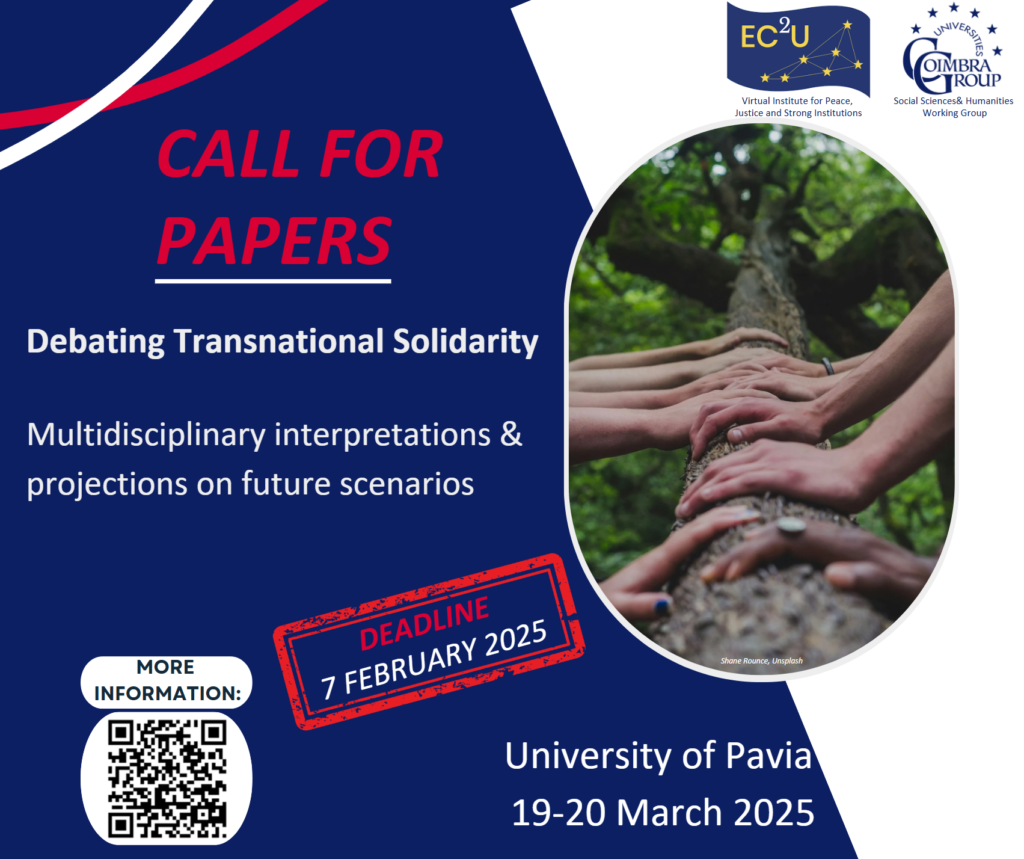
Context
The idea of solidarity has inspired Romanic civil law, taking up new perspectives of semantic and normative articulation across the centuries. On this path Durkheim’s concept of organic solidarity has represented a turning point, moving beyond the idea of a social integration between members of a society endowed with shared values and beliefs.
At any rate, as an overarching idea, both descriptive and normative, solidarity continues to present us with high levels of contestation, as it evokes a variety of meanings and is not reflected in one single theory that has achieved universal acceptance. Solidarity is invoked in political contexts in which requests of social equality, economic justice, integration of diversity and, more generally, support of vulnerable individuals and/or groups are at risk. For centuries appeals to solidarity as a political principle reflecting multiple meanings have been launched by political theorists and philosophers in relation to its supposed capacity to strengthen social bonds not only within relatively homogeneous communities (such as nation-states championing allegiance to shared political, cultural and/or religious values and traditions), but also, more recently, in liberal-democratic societies and international and supra-national organizations, addressing a plurality of perspectives and ideas of justice, equality and welfare. Solidarity is a two-way phenomenon: it emarginates those who fail to meet the needed requirements for membership in a certain community or promotes a form of cohesiveness which appears able to coexist with diversity. In this respect, as the sociologist Judi Dean has contended, we refer to a tension between an “exclusive” and a “reflective” solidarity1.
Focusing on Transnational Solidarity (TS) means broadening further the concept of Solidarity per se by including sustainability in international relations, especially international economic relations, coexistence, equal partnerships and equitable sharing of benefits, resources, and burdens. Transnational networked solidarity can be spontaneous or manufactured in response to old or new threats. At the European level, cross-national solidarity, at difficult times can produce togetherness. But is an “ethos of togetherness” sustainable? (Maurizio Ferrera 2022). Sustainable solidarity can be seen as common interest versus self, national interest and implies a certain degree of reciprocity, also defined as profitable altruism. (Nikolaidis and Viehoff, 2012) EU solidarity is a significant test case: in this regard, the redistributive policies of the EU are not just conceived to correct the outcomes of supranational market and economic integration, but they can foster a sense of togetherness, reinforcing the EU polity. However, EU solidarity implies that some member nations are expected to make significant sacrifices for the benefit of others (Etzioni 2013; Ferrera and Burelli 2019) and that some member states are closer to each other than to others. A special relationship between member states within the EC/EU can impact on cross-national solidarity (Ferrera, M. (2022). In the field of political theory, we should ask whether conceptualizations of solidarity as an ideal capable of inspiring and normatively justifying political decisions are needed or a theoretical effort in this area is redundant (Sangiovanni 2013, 2015, 2023).
Historically, we know that within the European and global frameworks, crises such as the economic and financial crisis and later the refugee crisis have challenged transnational solidarity (Krunke and Petersen 2020) However a long-term process since the 19th century is still ongoing with solidarity replacing fraternity, brotherhood or charity, with a vision of a new, diverse and emancipating society in a scenario populated by individualised and unconnected actors (Jacek Kołtan 2023). Since Durkheim, defining TS as a cooperative relation between individuals based on a mechanism of division of labor, parcelization has not been considered necessarily an obstacle in granting support within dis-homogeneous groups. (Durkheim, 1893) A link between solidarity and justice framed by Habermas has enriched further the discussion with an interconnection between solidarity, rights – particularly human rights -and justice (Habermas 1986,1990).
The Conference
Building on the ongoing, multidisciplinary debate on transnational solidarity, the Pavia conference will focus on common regional and global responses confronting poverty, wars, population pressure, the impact on labour and migration and the misuse of natural resources. David Featherstone’s comprehensive approach is a starting point for scholars of the Global South to look towards the labour of building solidarity (Featherstone 2012, 46) and discuss the numerous strands of anticolonial solidarity within the Global South. Finally, most AI ethics principles are drafted in the global North and be alien to the Global South, even as the latter provides resources for the development of AI data infrastructure. There is a risk that AI related anti-solidarity measures will be strengthened, thereby worsening the digital divide between and within countries and among different sectors of society.
Against this very rich and stimulating background, the conference will seek to explore ethic, economic relations and models of solidarity over time, the European and non-Eurocentric view, the lexicon of solidarity, solidarity and postcolonialism, future scenarios of solidarity/non-solidarity, including conflict and post-conflict situations and the AI debate in Ios.
Key questions to be addressed at the conference:
- Can TS be created or re-created in international relations?
- Does TS contribute to shaping contemporary views of international justice?
- Which are the cleavages that divide groups aiming at TS solidarity: European and non-European test cases.
- How has TS developed in the historical processes that lead to the progressive elaboration of a distinctively European Union?
- Which philosophical theories might contribute to the elaboration of contemporary practices of TS?
- Is the language or linguistic of TS helping us to understand how to frame or perceive cross national solidarism?
- What is the role of culture in shaping and representing sentiments of solidarity across geographical and political/ideological boundaries?
- The question of ‘the other’ and solidarity in Europe: from Enlargement to Neighborhood policies and immigration policies.
- Is TS leveraged by soft power/public diplomacy and undermined by disinformation?
- Does AI represent a challenge to TS?
Proposals on the topic of the conference and more specifically related to the above areas should be sent to Ilaria Poggiolini (ilaria.poggiolini@unipv.it) and Elena Irrera (elena.irrera2@unibo.it) by 7th February 2025.
At this critical moment in history, the EU needs to fully endorse research in the Social Sciences and Humanities (SSH), the European comparative advantage in global science. Coimbra Group joined other key R&I stakeholders in issuing a common statement urging the European Commission, the European Parliament and the EU27 Member States to endorse the crucial role of the SSH in the forthcoming EU Framework Programme for Research and Innovation (FP10). Together, we call for
- A European funding programme for R&I that:
- (a) places researchers representing all disciplines at the heart of all aspects of its decision making processes;
- (b) is inclusive of all disciplines; and
- (c) invests more in SSH research that encourages innovation, shapes markets and environments for sustainable transformation and societal well-being.
- Strengthening the full integration of SSH disciplines in the implementation of EU R&I investments.
- Dedicated funding for SSH in FP10 to address the major threats and opportunities of Europe, from innovation to sustainable and inclusive growth.
Read the full statement:
Ludovic Thilly, Coimbra Group Executive Board Chair
Beatrix Busse, Coimbra Group Executive Board Vice-Chair
The month of November 2024 is probably another turning point in our European society, with the elections in the United States of America and their unavoidable impact on the European Union, the approval of the “von der Leyen II” European Commission by the European Parliament, among many other impactful events and elections in Europe. In such complex times, it is important to take a step back and reflect on what is the role and value of a university network such as the Coimbra Group, a few months before its 40th anniversary, in 2025.
On 1st December, the new College of Commissioners took office. When its composition and mission letters were published last September, a wave of questioning has swept over the whole higher education sector, especially because some important words were no longer mentioned. These included “Education”, “FP10”, etc. In addition, the whole structure and portfolios of this new Commission have been revamped. It seems that Universities have lost what (at least) Coimbra Group had found to be one of the assets of the previous Commission: a single Commissioner for Education, Research and Innovation (R&I). It is certain that we will now enter, again, a complex jungle of advocacy channels, events, policy briefs and communications to ensure that the Universities’ voice is heard to retain and advance the crucial need to strengthen knowledge creation, education and dissemination, via unprecedented political support to Universities and ambitious budgets allocated to upcoming Erasmus+ and FP10 programmes, among other burning topics.
In a time where society is polarised between “post-truth”, “climate anxiety”, “risks of AI-induced dehumanisation”, etc., we believe that university networks such as Coimbra Group should remain a lighthouse for their member universities and the focus on science and education the basis for knowledge. We should continue to treasure this safe space for cooperation that also has a role in keeping a vivid link between Universities and citizens. To co-create together is no longer an option, but a must.
Indeed, one of the many assets of the European Higher Education and Research landscape resides in its diversity of actors, each of them bringing a specific dimension to Knowledge, populating the rich spectrum of disciplines, Technology Readiness Levels (TRLs) and Societal Readiness Levels (SRLs).
So, on the threshold of the 40th anniversary of the Coimbra Group, in a society and political landscape that have never been so complex, we declare here that it is now time for university networks to genuinely unite and defend together all the facets of Knowledge and Universities. This is what is Coimbra Group made for, we are convinced.
Workshop at the Coimbra Group Annual Conference – Wednesday, 5 June 2024, Turku (Finland)
Joint event organised by Working Groups Heritage, Latin America and Global Partnerships
The initiative was motivated by the growing need, perceived at various partner institutions and resonating in the public discussions, of a new approach to knowledge construction and also to the history of their own institutions, and their involvement in the past in the processes that shaped the global situation of the present day. The new challenges facing the global community today, such as climate change, pandemics, and migration, clearly indicate the necessity for an intercultural attitude in knowledge construction that can no longer be considered as a specificity of Western world but rather as a plural and multi-centred space.
There was an effort to go beyond the realm of theoretical discussions that can cross-fertilize academic policies and the way they are conceived in relation to the Global Majority. The core idea was to share experiences of researchers who have built solid research/teaching experiences with non-European realities based on intercultural and collaborative principles in order to enhance added value and good practices. The purpose of the workshop was to induce a profound rethinking of the colonial entanglement in academic relations through which all sides can mutually benefit.
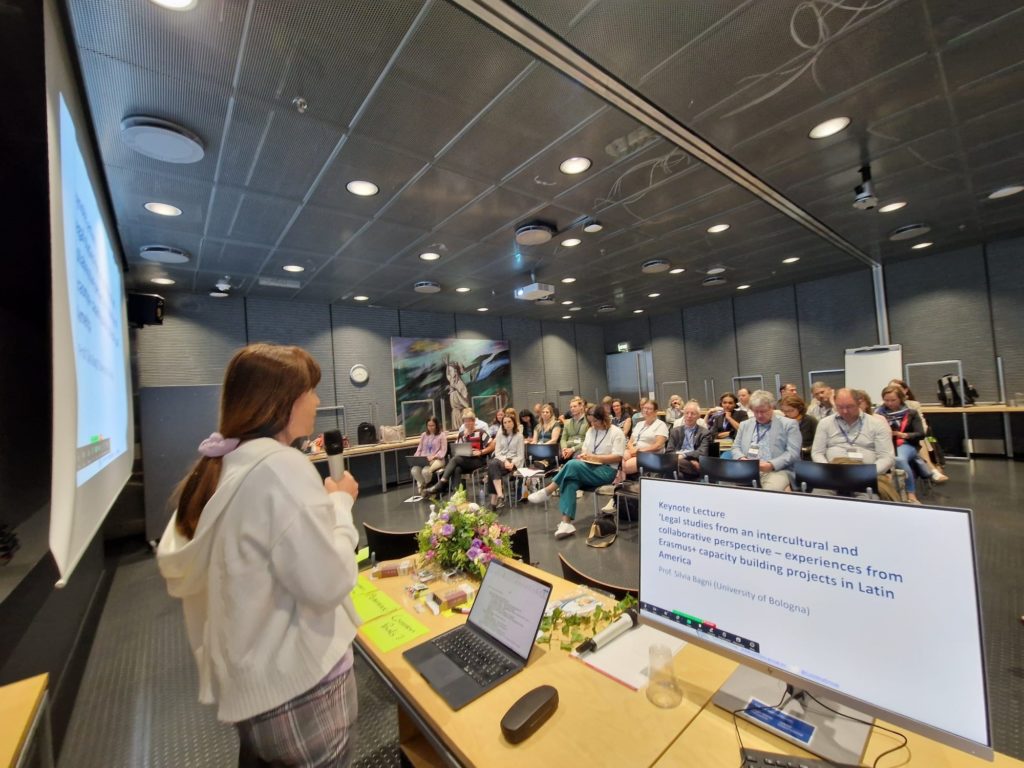
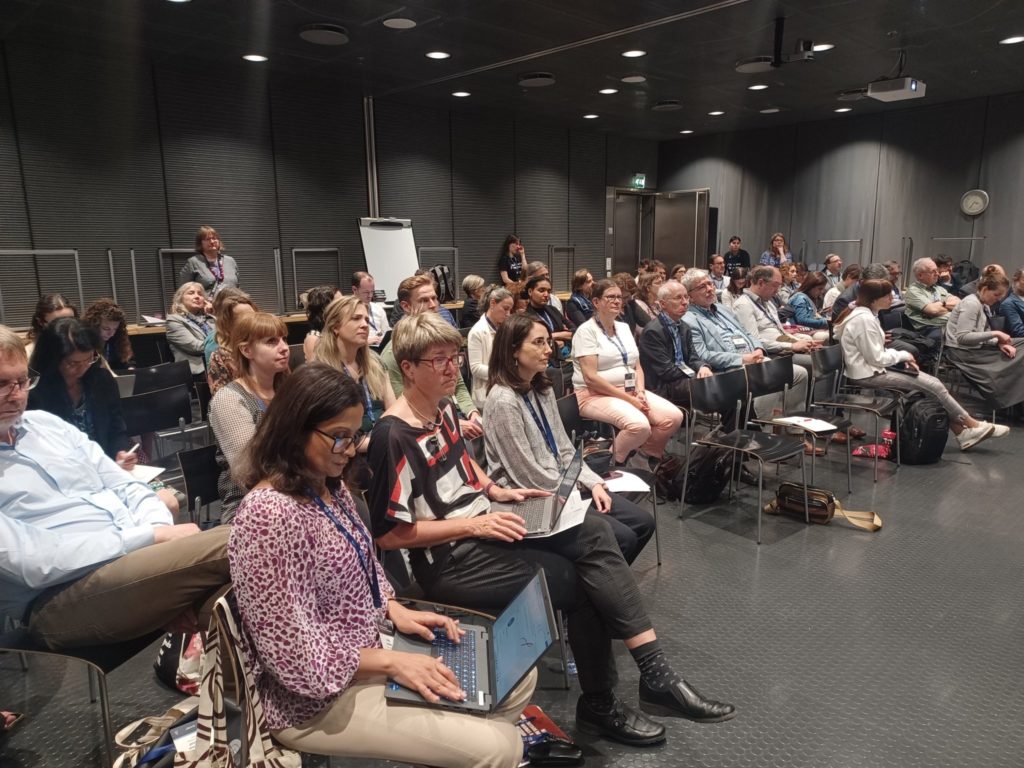
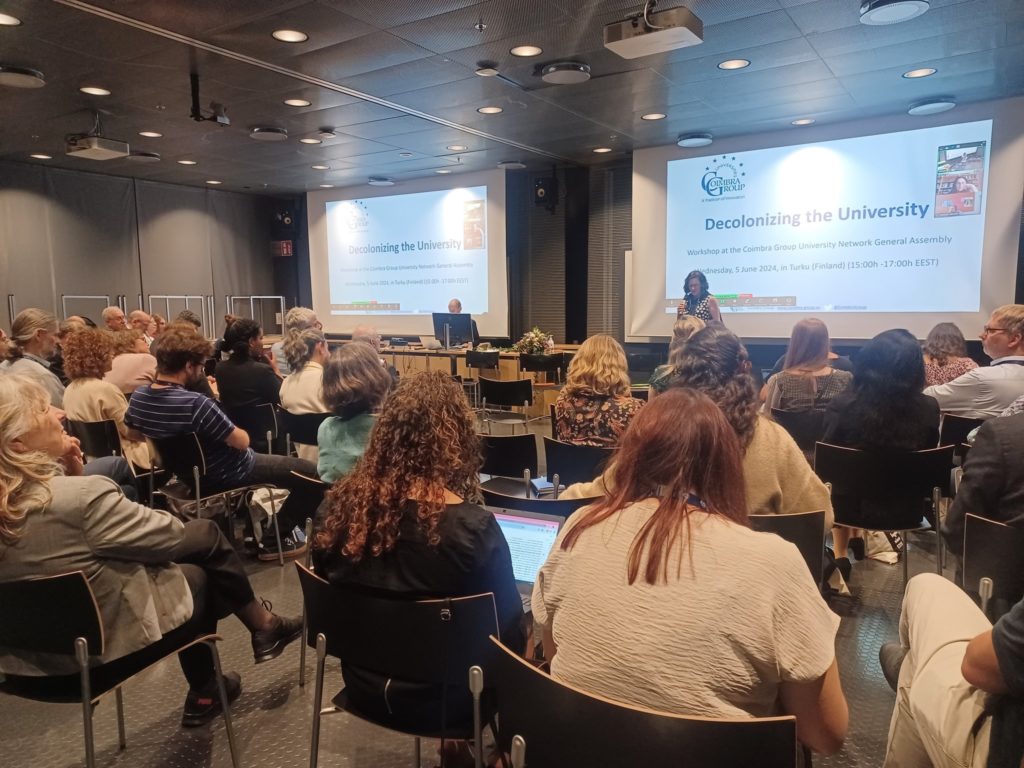
In her welcome speech, Prof. Leila Koivunen from the University of Turku emphasised the importance of the topic, as the problem of decolonization concerns universities everywhere in Europe, and reverberates both in the inner workings of the universities and in their international agenda, especially in the partnerships with institutions from Global Majority. She noted that the historical legacies of exclusion and oppression continue to affect universities to this day. She brought as an example the long history of the University of Turku and Abo Akademi, marked by language conflicts, identity formation processes and the complicated history of Finland that several times brought it into subordinate position towards foreign powers. As Finland itself had never held any colonies, the traditional narrative of national history presented the image of colonial innocence, or even portrayed Finns as victims of colonisation. Only recently, these notions had been challenged through such concepts as colonialism without colonies or cultural colonialism, and the calls for a re-evaluation of Finnish connection to the colonial world. Historical research shows that Finland, and many other European regions, became connected to the colonial world in various ways and benefited economically from the colonial world order (colonial ethos with local varieties). Concluding her presentation, Prof. Koivunen again highlighted the complexity of the processes of decolonization, and the need to learn from the experiences of others.
The first keynote lecture, “Decolonisation’s Long Struggle: Imperialism, the University, and the Advent of Artificial Intelligence’, was delivered online by Prof. Parvati Nair (University of London), Professor of Hispanic, Cultural and Migration Studies and Convenor of QMUL’s Global Policy Institute. It opened with reference to Frantz Fanon, who inspired several revolutions and African independencies. Sixty years later, decolonization remains a challenge in Europe, and the ‘post’ in the ‘postcolonial’ does not denote decolonization. At the European universities, decolonization is at the same time a project in the making and undermined, as the personal experience of Prof. Nair confirmed.
She reminded the participants of the workshop that the debates on decolonization in the university took an important turn with the ‘Rhodes Must Fall’-movement of 2015. It was especially the students who first exposed the continued impacts of historical injustices and institutional racism, power imbalances and abuse. The murder of George Floyd in 2020 and the global spread of the ‘Black Lives Matter’ (BLM) movement in 2020 brought another important impulse. Prof. Nair accentuated the need to consider what we teach, to include silenced and obscured history and to actively engage with non-Western forms of knowledge, to redress epistemological imbalances and question the very canons upon which European education is depended. The vision of decolonization rests upon critical scrutiny, and university can be a space for radical thought.
Among the challenges to decolonization at present, Prof. Nair named the international market for global education. Giving the example of the United Kingdom, she stated that once a privilege, university education has nowadays entered the free market and become commodified, so that universities have become fee paying institutions that are driven by profit and primarily charged with providing skills for employability. Prof. Nair stated education as a civil right (human and planetary right) and not a capital acquisition. The overriding neoliberal contexts within which universities operate thus turned into ongoing and renewed forms of imperialism that threaten to engulf academic and intellectual freedoms. Also, Artificial Intelligence (AI) has opened, across disciplines, further dilemmas as technology serves many purposes and empowers many ideological fronts. There are many at the moment still unseen implications of AI with regard to the Global South and social (in)justice, namely in what concerns research’s integrity. Thus the struggle for human and planetary justice needs to react to these issues, and the same is true for the efforts to preserve academic integrity and academic freedom. Still, the movements of solidarity against oppression are connecting universities in solidarity, and are student-led. Referring back to the empirical and to student-led action, she cited the ongoing student protests at campuses across the world in the name of solidarity for decolonization. Through such cooperation major ideological and systemic change can be conceived. Prof. Nair referred to the book “Empires of the Mind. The Colonial Past and the Politics of the Present” to underline the fact that the transition between the five phases of decolonization, discussed in the book[1], is not a smooth one, and highlighting the need to take decolonial action. The speech concluded with an appeal for solidarity to those who dare to dream differently.
The second keynote, ‘Legal studies from an intercultural and collaborative perspective – experiences from Erasmus+ capacity building projects in Latin America’ by Prof. Silvia Bagni (University of Bologna), brought forward some examples of good practices of cooperation with Latin American universities in the framework of three Erasmus+ ‘Capacity Building in Higher Education’ (CBHE) projects (‘OPTIN’, ‘REMOVE’, and ‘DEMOS’). Prof. Bagni outlined the challenges to the efforts to build interdisciplinary and intercultural study programmes that could harmoniously mix the skills and competences within the staff participating in the project, and give the opportunity of mutual learning for both European and Latin American partners. She mentioned areas in which the knowledge and skills of Latin American partners were extremely important – such as the study of the rights of nature; the research of migrations; and the study of populism. Regarding the implementation of the projects, Prof. Bagni emphasised the importance of having participatory management structures, to jointly co-develop the project deliverables (articles, teaching materials), and to organise moments of restitution with the project’s target groups. She also offered some critical perspectives both on the overall objectives of the CBHE programme and on the technical rules that govern these projects, such the financing or the fact that all countries from Global South are considered equal within E+ schemes. She proposed to shift the methodology of EACEA international cooperation strategy from ‘Capacity Building’ to ‘Mutual Learning’.
Next, four examples of ‘decolonization in practice’ at European universities were presented.
The first of the case studies of good practices presented, “Decolonizing scientific collections”, was delivered online by António Carmo Gouveia (University of Coimbra). It outlined the richness and variety of natural history collections of the University of Coimbra, stemming from former colonies in Africa (Angola, Guinea Bissau, Mozambique and São Tomé and Príncipe), but also from Brazil, India, Macao and East-Timor, housed in several institutions, such as the Science Museum, the Herbarium, or the Botanic Garden. These collections have been long disconnected from their origin, so that it is sometimes difficult to recognize colonial origins and contexts and violence associated, since the natural sciences are seen as more benign. Prof. Carmo Gouveia concluded that the University of Coimbra has both ethical and scientific responsibility to initiate a discussion on decolonising the scientific collections under its care. He narrated the progress of the discussion on decolonizing these “invisible” collections, and the fact that the public debate in Portugal is still critical on matters such as restitution and repatriation, and that these attitudes are present even within academia. He appealed to the audience that in spite of these attitudes, the university should not be afraid of the commitment and ethical obligation to change the way we deal with this sensible heritage. He also proposed some paths for the future, such as the promotion of biodiversity through the natural historical collections; digitalization and open access to the digitised collections (for instance, the database ‘Plant Letters[2]‘), and the promotion of the notion of shared stewardship (partnership in the creation of the herbarium of São Tomé and Príncipe and the Botanical Garden of the University of Lúrio, Mozambique, as good examples). Finally, Prof. Carmo Gouveia highlighted the need to expand to diversify the university narratives, to engage other voices (such as local actors and descendents) and to promote collaborative efforts. Decolonising natural history collections must be an inclusive and enduring process, anchored in continuous learning and sharing, allowing for improvements and responding to the changing expectations of the actors involved.
The second case, “Dealing with complex pasts”, was presented by Markéta Křížová (Charles University). It dealt, first, with concerted efforts of several universities represented in the Coimbra Group to deal jointly with the “uncomfortable” legacies of the past of colonialism, but also authoritarianism and modernization. This legacy imprinted itself both in tangible and intangible heritage of European universities, be it in the museum collections, the university buildings and campuses, or the specific intellectual traditions. The initiative has so far resulted in the Horizon Europe application (under the leadership of University of Utrecht) and open-access volume in preparation (to be published by Edinburgh University Press). But the most important result is the fact that through joint action, there is a chance to start the process of change even at universities that have so far not paid attention to these aspects of their histories. In her presentation, prof. Krizova presented an example of this change process within the Hrdlička Museum of Man at Charles University in Prague. Founded in 1937 as a museum of anthropology, the museum retains the spirit of colonial complicity and Eurocentric narrative of the development of humankind. The efforts to change this attitude have so far been prevented by the prevailing “colonial innocence” discourse in the Czech Republic, both in the public domain and in academia. Turning point for the debates on decolonization in the Czech Republic was the year 2015, when the migration crisis started and the Czech society and Czech representatives responded negatively to the calls for solidarity, precisely with the argument of non-participation of Czechs in colonial atrocities. It is only the younger generations of scholars and the students who raised the issues of decolonisation. With respect to the Hrdlička Museum of Man, with the backing of partner universities from the Coimbra network, it became finally possible to start the debate about changes in the exhibition and the attitude towards the human remains in the collections.
The third case study focused on “Language as an instrument of colonial power” and was presented by Rebeca Hernández (University of Salamanca). Starting with the excellent program of Spanish language at that university, and with reference to the first grammar of Spanish language by Elio Antonio de Nebrija (1492), she evoked Nebrija’s famous pronouncement that language was a “companion to empire”. Nebrija’s work not only marked a significant milestone in linguistic studies, but played a crucial role in the conception of Spanish as the language of a future empire. Also, this grammar would later pave the way for the writing of the first grammars of Amerindian languages by Spanish men.
The use of language as an instrument of power in European colonial projects has been a central point in the postcolonial and decolonial debates developed in the last decades in the academic context. Language and Empire have gone hand in hand, and the native languages in the colonised territories suffered the consequences of Eurocentered colonialism, as Western languages were used to civilize, introduce architectures of knowledge, and write over the recording and transmission of the different histories, stories, and cultures. Prof. Hernández cited the work of Grada Kilomba to underline the need to decolonize knowledge and the role that language plays in this process. In this context, prof. Hernández presented various practices that aim to challenge the Eurocentric narrative being developed at the University of Salamanca, especially the teaching of indigenous languages and collaborative projects with Latin American partners.
The final case study, “The relationship between the University of Leiden and the colonial and slavery past of the Netherlands”, was delivered by Mara Constantinescu (University of Leiden). It dealt mainly with the institutional and political stance towards the issue of decolonisation, and concretely the involvement of Dutch institutions (including the University of Leiden) in slave trade.
The presentation started with a more general reflection on the recent debates in the Netherlands as to the colonial past. At Leiden University these debates have caught force since the massive Black Lives Matter protests. The question of the involvement in colonialisation and slave trade has been taken on as fundamental and definitory for the institutional identity of the University of Leiden. In 2023, the Executive Board decided the formation and funding of a research group that would investigate the relationship between the University of Leiden and the colonial and slavery past of the Netherlands. The group’s main focus is to respond to the following questions: i) How did our academic community position itself in relation to people who were robbed of their freedom? ii) What role has the University played as an educational institution with regard to colonialism and the slavery system? iii) How can the University best handle its special collections? Researchers (PhD students and Post-Doctoral researchers) from outside of the University of Leiden were hired to study these questions. Mara Constantinescu explained that, using this as a starting point and actively considering the academic community’s voices in addressing the impact of its past on present power relations, the aim was to create a framework for constant self-reflection and an environment where not only reflection, but action is made possible. This conversation does include ties with the fossil fuel industry and students’ protests in support of a cease fire in the Israel – Palestine war. Constantinescu ended her presentation by stressing that the exercise of decolonization is also a challenge for the colonised.
The final part of the workshop was dedicated to the interactive discussion under the joint title Challenges for the future. While numerous questions were posed and debated, there were several clusters of topics that were addressed. First there was the issue of the democratisation of knowledge (including the language), and the means to truly give voice (but not force the expression) to all those involved. Also, the Eurocentric knowledge production was flagged as an important topic in the decolonisation process, together with the question of ‘we/they’ and the forced dichotomies that stood at the base of the colonial world system.
The recommendations accentuated the need to truly listen; to realize the complexity of the issues and actors involved and resist the urge for quick answers and solutions; and to address both the highest management of the universities and the general public.
The unanimous recommendation was to continue the debate on different forums, and to include the topic of decolonisation among the core transversal topics within the Coimbra Group. One of them was how to communicate such sensitive issues to the general public – perhaps coordinating with Research Support Officers Working Group.
Coimbra Group Co-organisers:
CG WG Heritage: Marketa Krizova (Charles University)
CG WG Global Partnerships: Katia Cardoso (Coimbra University), Piet Wostyn (KU Leuven)
CG WG Latin America: Edoardo Balletta (University of Bologna), Omar Garcia (Trinity College Dublin), Kirsi Korpela (University of Turku), Mara Constantinescu (University of Leiden)
[1] Poka Laenui_5 key stages of decolonization: “ 1) Rediscovery and Recovery, 2) Mourning, 3) Dreaming, 4) Commitment, and 5) Action. Each phase can be experienced at the same time or in various combinations. Like the steps of colonization, these phases of decolonization do not have clear demarcations between each other.”
[2] https://cartasdanatureza.uc.pt/
The University of Pavia hosted delegates of the Coimbra Group Global Partnerships Working Group for their Autumn meeting. The two-day meeting concluded with the conference “Building Together: Enhancing European and African Collaboration in Research and Innovation”, organised jointly with the European Association of Development Research and Training Institutes (EADI).
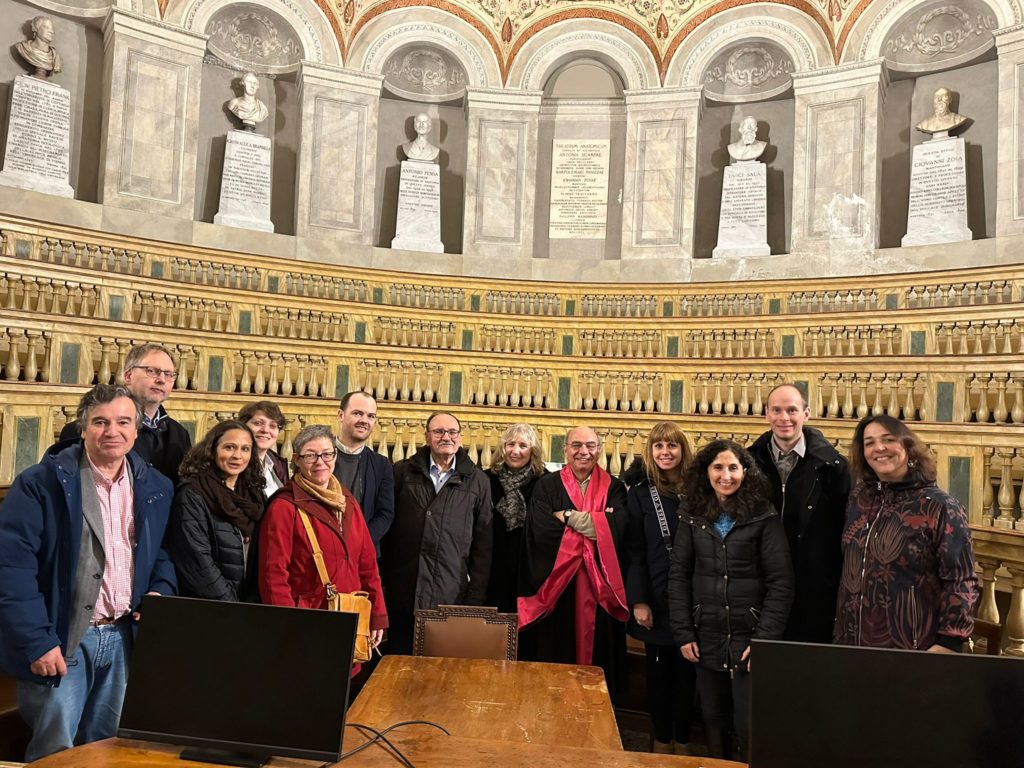
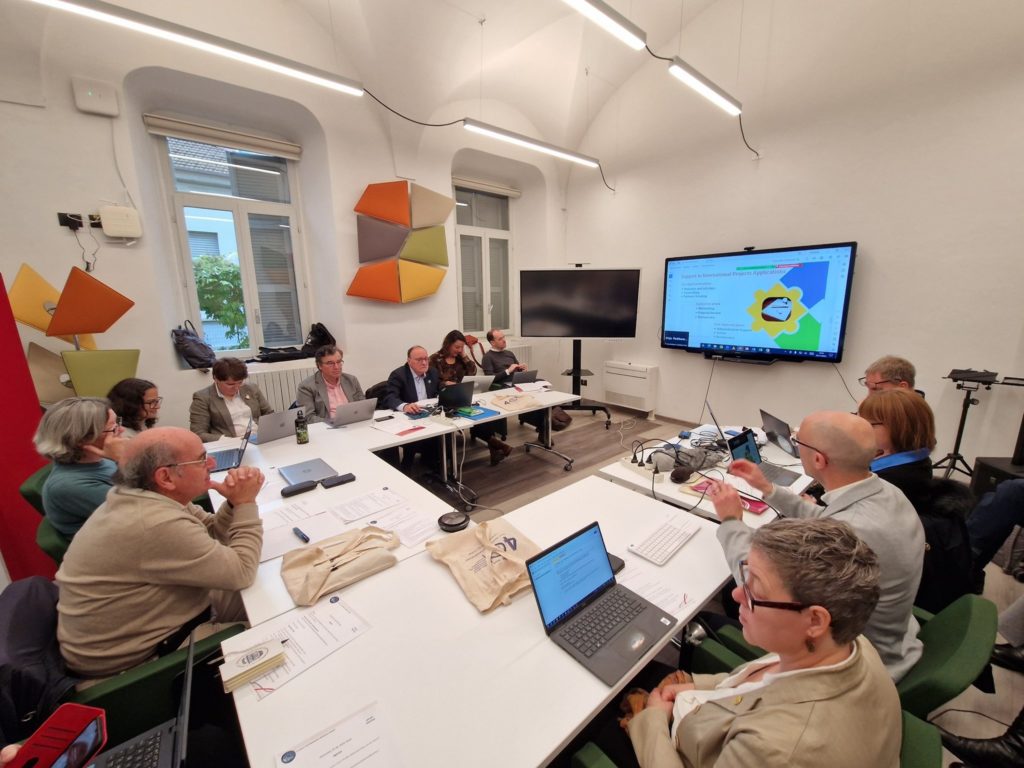
During the Working Group meeting, the University of Pavia presented their structure and ongoing activities in the field of cooperation, specifically through the Center for International Cooperation and Development (CICOPS), celebrating 40 years of existence at the University of Pavia.
The Global Partnerships Working Group discussed the ongoing and future initiatives, such as the Sumer School on multilingualism, the series of workshops on “decolonising the University”, further steps to the implementation of the Africa Charter for Transformative Research Collaborations, the Coimbra Group initiative on peace & conflict studies, the networking series with he University of Namibia and also the preparation for the Annual Conference and General Assembly 2025, taking place at the University of Bologna.
“Building Together: Enhancing European and African Collaboration in Research and Innovation”
The full-day conference was aimed at fostering a collaborative spirit by bringing together leading professors from both continents and representatives of public institutions to explore synergies, share knowledge, and co-develop solutions to global challenges. Representatives from the European Association of Development Research and Training Institutes and from the Coimbra Group Coimbra Group provided their expertise, alongside representatives from African universities and from the Italian Agency for Development Cooperation.
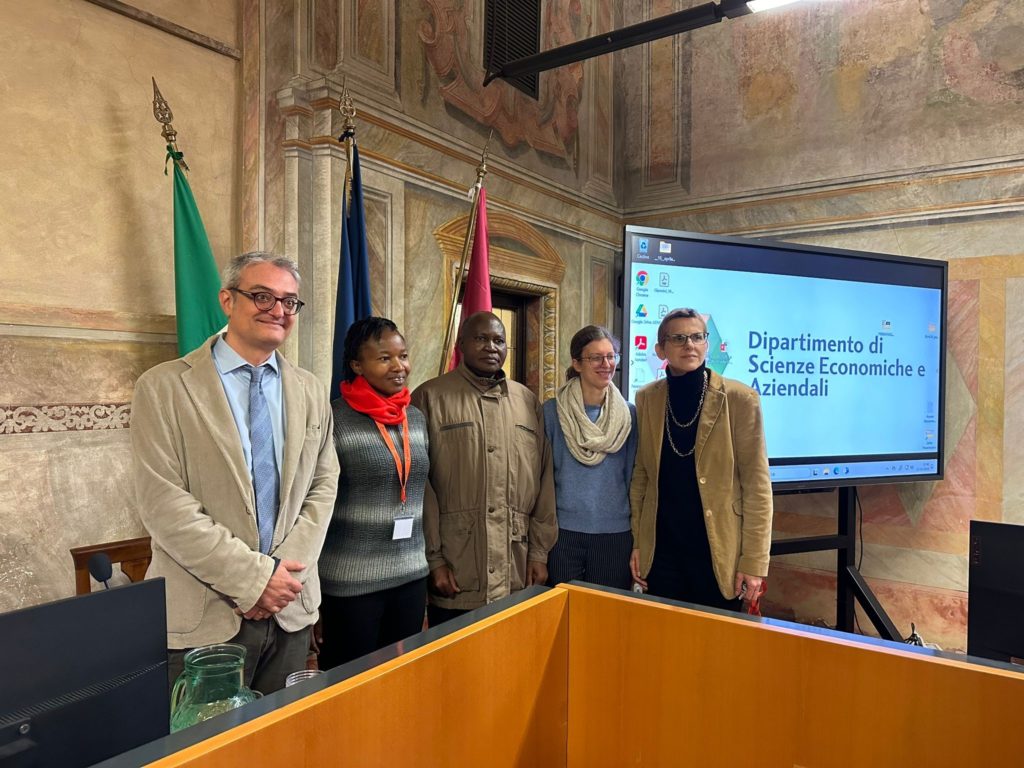
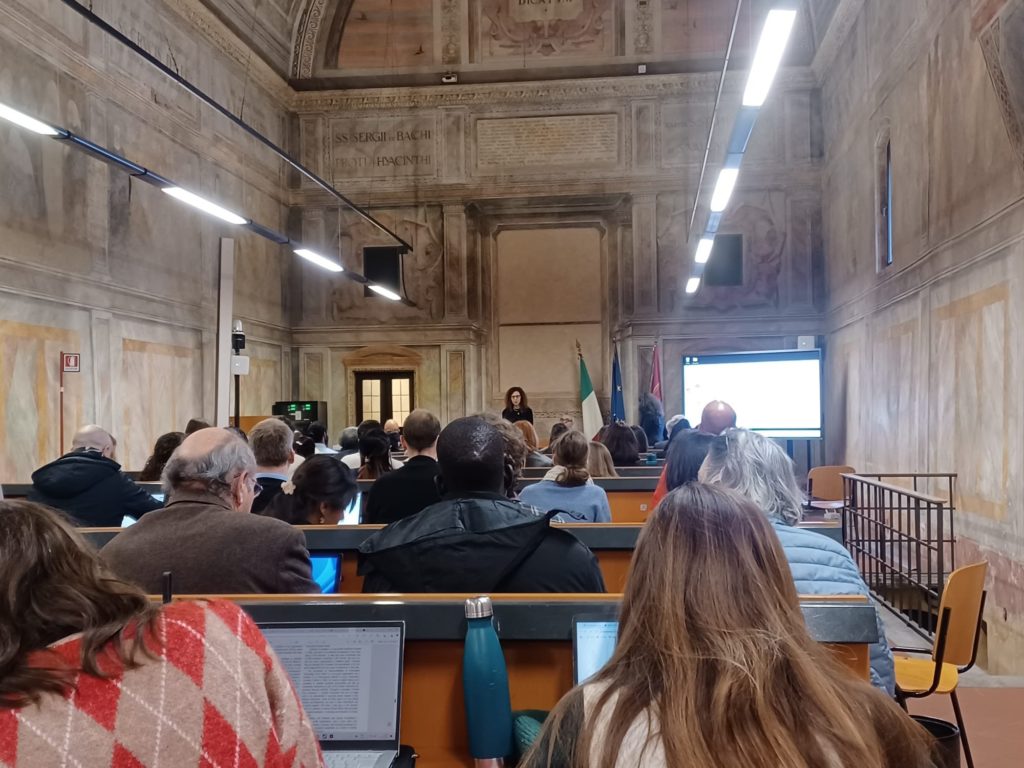
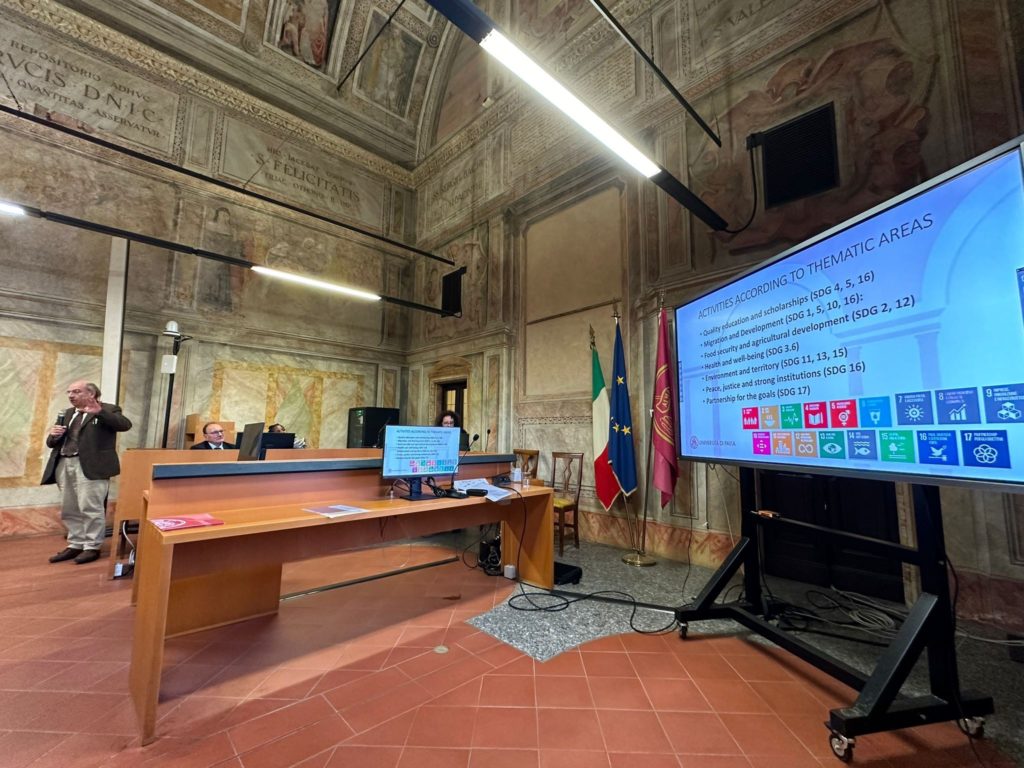
The discussion focused on the current challenges and opportunities in collaborative Europe- Africa research, strategies to support Euro-African partnerships to generate, disseminate and use knowledge and also on the development of sustainable solutions to global challenges. The event built on existing networks and good practices, fostering opportunities for joint research initiatives, with the ultimate goal of promoting unified research environment that benefits both continents, fostering innovation, mutual understanding, and a shared commitment to solving the world’s most pressing problems.
The Coimbra Group represented by Office Director Emmanuelle Gardan attended the second Conference on Research Careers organised by the European Commission in Brussels on 26 November. Prof Robert Dijkgraaf, Former Minister of Education, Culture and Science in The Netherlands, delivered the first keynote. He notably highlighted a number of factors to create an attractive research culture:
- Recognition of diverse carrer paths
- Reward diverse roles using multiple metrics
- Expansion vs inclusion for underrepresented groups
- Eliminate artificial distinction between professional categories
- Empower and involve the next generation for Europe
In the second keynote, Prof Manuel Heitor, Former Minister of Science, Technology and Higher Education in Portugal, and Chair of the EU expert group evaluating Horizon Europe and setting up priorities for FP10, emphasized some of the expert group’s recent report (“Align, Act, Accelerate“)’s key recommendations for enhancing the attractiveness of research careers in Europe. He notably outlined the recommendation number 5, for the European Commission to create a new instrument under the existing MSCA’s co-funding mechanism to foster the careers of young researchers: “Choose Europe”. The expert group suggests starting wih a pilot experimentation in 2025 already.
The other presentations in the plenary session were delivered by policy officers from DG RTD, altogether providing a rich and comprehensive overview of the achievements of the ERA Policy Agenda 2022-2024 directly or indirectly connected to research careers. All presentaions may be downloaded from the Coimbra Group Intranet (for CG members only). A replay of the conference is available for all on the Conference website here.
After the plenary session, the Coimbra Group, jointly with Portugal (as both ERA Action 4 co-sponsors) and the European Commission, hosted a dedicated session on ERA Action 4 “Attractive Research Careers” where the delegates from the EU member states, associated countries and stakeholders commited to ERA Action 4 brainstormed constructively on possible actions to include in the next framework programme FP10 and on first ideas for the content of the future ERA Act when it comes to research careers. The discussion was inspired by bold input from Prof Robert Dijkgraaf, Prof Manuel Heitor and EU-LIFE Executive Director Marta Agostinho, which led to dynamic and prospective exchange of views.
The Alexandru Ioan Cuza University of Iasi recently hosted the Coimbra Group’s High-Level Seminar on “(Generative) Artificial Intelligence in Higher Education,” bringing together university leaders, policymakers, and students to discuss the transformative potential of AI in academia. Welcoming remarks from Liviu-George Maha, Rector of Alexandru Ioan Cuza University, Mihai Chirica, Mayor of Iasi, and Ludovic Thilly, Chair of the Coimbra Group Executive Board, set the stage for vibrant discussions, emphasizing the need for collective strategies to address both opportunities and challenges posed by AI.
Keynote speakers showcased a wide range of perspectives. On Thursday, Simon Roy (OECD) explored how higher education institutions can better prepare for AI’s rapid evolution and how the OECD aims to support this transition. Pinar Heggernes (University of Bergen) emphasized the importance of equipping students with critical skills for digital transformation and the role of lifelong learning in bridging existing gaps. Friday’s keynotes added further depth. Beatrix Busse (Vice-Chair of the Executive Board, University of Cologne) examined the interplay between generative AI and well-being in education, proposing a holistic humanistic approach to integrate and reflect on AI. Florin Olariu (Centric IT Solutions) provided insights into AI’s role in education from an industry perspective, highlighting practical applications and future trends.
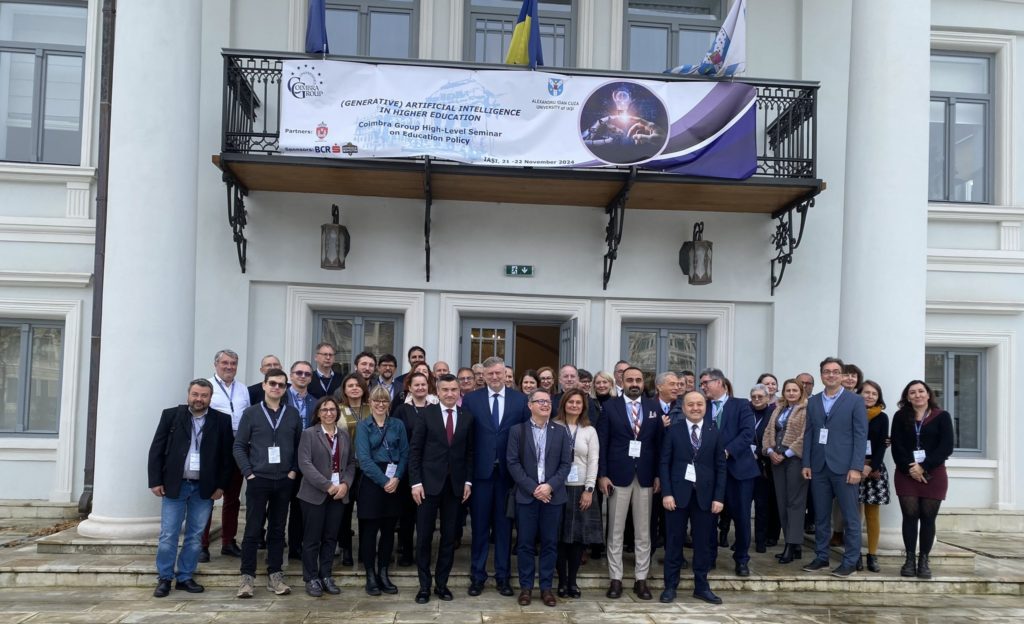
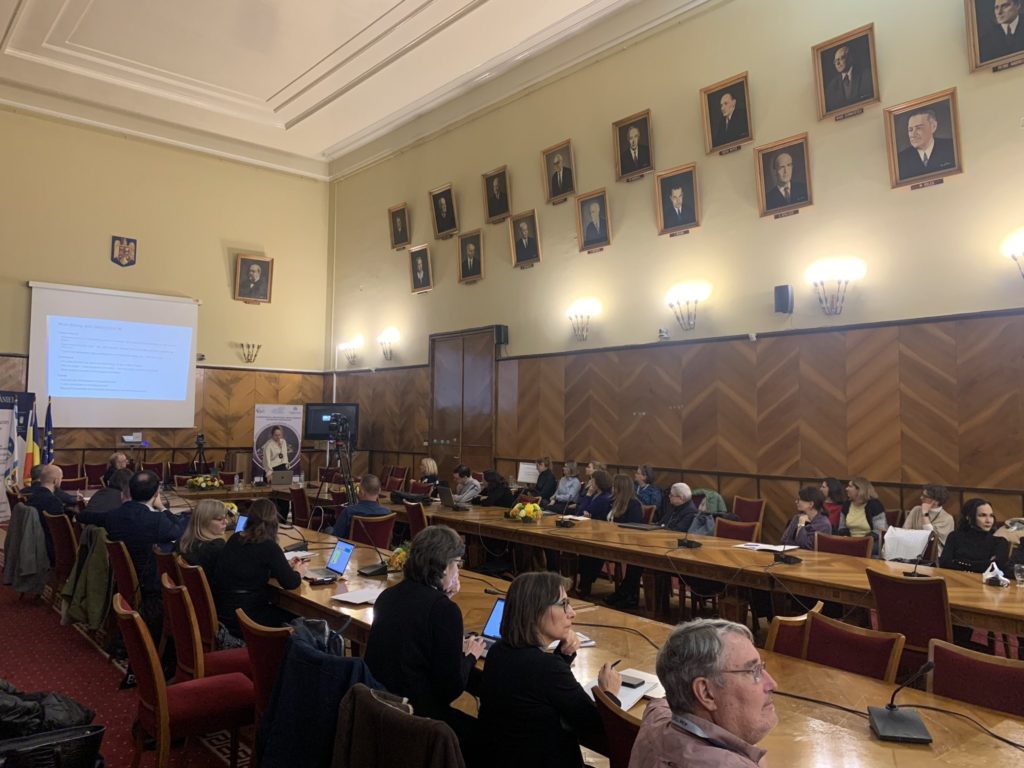
The event also featured student voices and collaborative workshops. Students shared experiences using AI tools like ChatGPT for creativity, self-evaluation, and learning, while raising concerns about digital literacy and academic integrity. Interactive sessions enabled participants to co-design strategies for AI integration, tackling challenges such as resource constraints, inclusivity, and ethical standards. This seminar marked a crucial step in shaping policies and practices that balance innovation with equity in higher education. Coimbra Group is committed to be at the forefront of a human-centric approach to the AI challenge.

BRUSSELS/BUENOS AIRES, 24 October 2024. CLACSO and the Coimbra Group of Universities announced today that they have agreed on forming an inter-institutional cooperation to develop and promote research, education and innovation as well as activities oriented to shared and collaborative publications. These joint actions will benefit the academic community, citizens and the society at large, particularly bridging scholarly collaboration between nations and countries in Latin America, the Caribbean and in Europe.
This new partnership brings together two crucial, solid academic actors from both continents and serves to underscore the important strategic and political relationships between scholars, cultures, the public, and societies on both sides of the Atlantic.
“We are very pleased to now formalise academic relations with CLACSO, since we share important core ideals on the intrinsic value of research and higher education and are both strongly committed to protect and advance academic freedom, open science, open research information or even multilingualism to name just a few topics. This partnership will foster a common understanding of Latin American, Caribbean and European realities,” said Professor Ludovic Thilly, Chair of the Executive Board of the Coimbra Group. “With its long tradition of universities immersed in society, Latin America and the Caribbean are of utmost importance for helping us in further strengthening the societal engagement of our members in a changing world. Consequently, together we are now better positioned to find solutions to our common challenges.”
“The priority of safeguarding academic freedom and university autonomy in an increasingly complex social and political environment is a collective responsibility. Thus, partnering with the Coimbra Group is an important strategic action for us,” said Professor Karina Batthyány, Executive Director of CLACSO. “Collaborating with the Coimbra Group strengthens the global dimension of our research-based efforts in promoting human rights, democratic participation and critical thinking in today’s world. Moreover, this partnership is a concrete expression of the construction of solid and relevant bridges between academics, students and societies in Europe, Latin America and the Caribbean.”
This cutting-edge agreement between CLACSO and the Coimbra Group will run for an initial period of three years, during which the two organizations will explore the development of joint research projects, organise joint workshops and conferences and promote joint publications, among others.
***
The Latin American Council of Social Sciences – CLACSO is an international non-governmental institution with associative status in UNESCO, created in 1967. It currently brings together 938 research and postgraduate centers in the field of social sciences and humanities in more than 56 countries. Among its objectives, CLACSO aims to promote social research to combat poverty and inequality, strengthen human rights and democratic participation; to promote sustainable development policies in economic, social and environmental terms, using the contributions of academic research and critical thinking; and to build bridges between social research and public policies, promoting innovative, creative and viable actions in the face of the great social, educational, cultural and environmental challenges of Latin America and the Caribbean.
Coimbra Group – CG was founded in 1985 and formally constituted by Charter in 1987. It is an association of long-established European multidisciplinary universities of high international
standard. CG is committed to creating special academic and cultural ties in order to promote, for the benefit of its members, internationalisation, academic collaboration, excellence in learning and research, and service to society. It is also the purpose of CG to influence European educational and research policy and to develop best practices through mutual exchange of experience. CG has a longstanding Working Group on Latin America and scholarship programme for early-career researchers and professors from Latin America.
This article in PDF

The Coimbra Group has joined forces with other Research & Innovation organisations to advocate for the recognition of the outstanding success of Marie Skłodowska-Curie Actions (MSCA) and for an increased budget to unlock its full potential.
Since Horizon Europe started, Coimbra Group member universities have been granted 12,7 % of the total EU contribution towards MSCA. As Europe navigates unprecedented challenges and exciting opportunities, the need to invest in the Marie Skłodowska-Curie Actions is clearer than ever. MSCA nurtures talent, fosters groundbreaking research, strengthens global collaborations, and therefore has a key role in driving economic growth and securing Europe’s competitive edge in a rapidly evolving global landscape.
However, the current funding is insufficient to maintain the programme’s momentum and expand its reach. We therefore urge the European Commission, Parliament and Council to recognise the MSCA’s invaluable contributions by increasing its budget, while maintaining its purely bottom-up research character. This investment will improve application success rates (which currently stand at just 14%), expand access for a broader range of high-quality projects and, ultimately, empower even more researchers to excel.
“One of the fundamental values of MSCA is their major contribution to bottom-up research, both to individual researchers and to doctoral/postdoctoral programmes. Furthermore, MSCA is proven to be a highly effective programme in making changes in the institutional and national policies and strategies (such as researchers’ employability and career prospects, recruitment and supervisory rules and guidelines, skills development etc.) in the EU. Efforts should thus be made to increase MSCA funding“, stresses Ludovic Thilly, Coimbra Group Executive Board Chair.
Organisations endorsing this statement:

22 September, 2024
The Coimbra Group Social Sciences and Humanities Working Group (SSH WG) is pleased to announce the Call for Papers for the International Conference “AI Currents and European Universities” to take place on 17-18 October, 2024, at the Charles University, organised by the local team – Department of International Affairs at the Rectorate and Institute of International Studies at the Faculty of Social Sciences. The event is co-funded from the Coimbra Group WGs Funding Scheme.
We would like to invite contributions from the group members dealing with the issues, experiences and best practices regarding artificial intelligence that we would like to share and exchange in an open environment during a group meeting at Charles University in Prague.
The conference welcomes submissions in the domains of:
- Use of AI and computational methods in research
- Quantitative approaches and the data
- DH teaching practices in the interdisciplinary fields
- Data curation, sharing management
- AI and study ethics


